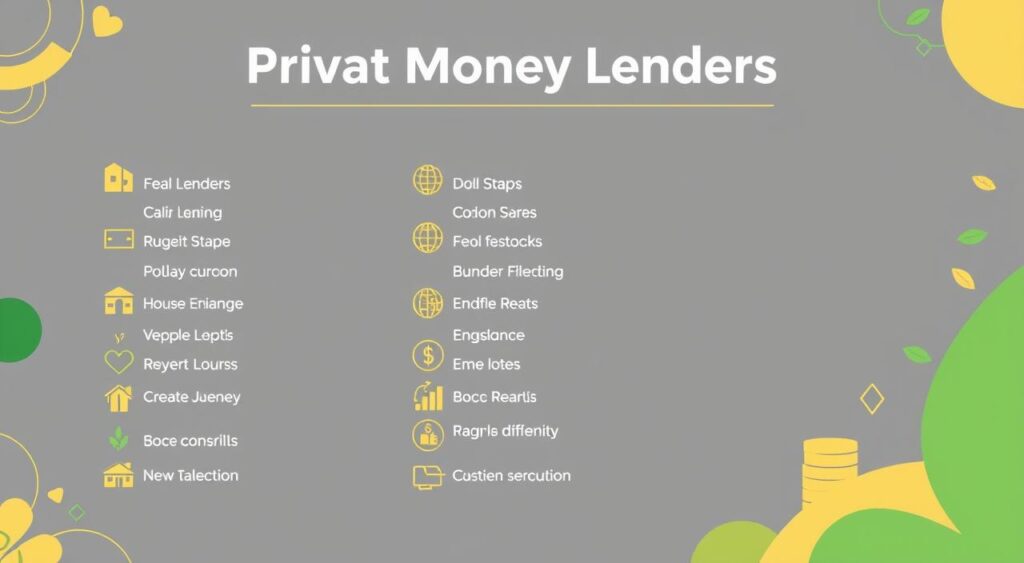Are you dreaming of becoming a real estate investor? Do you want options other than traditional banks? Private money lending is your answer. It offers flexible, asset-based solutions for your property investment dreams. Find the top private money lenders in the United States and learn how they differ from traditional lending.
Looking to buy a new property, refinance, or need short-term financing? Private money lenders can help. They offer the capital you need, often with quick approval and custom terms. This guide will show you the benefits, uses, and how to qualify for private money loans. It will help you make smart choices for your real estate goals.
Understanding Private Money Lending for Real Estate
Private money lending is a new way to finance real estate, different from bank loans. Private lenders, or “hard money lenders,” offer short-term loans. They focus on the property’s value, not just the borrower’s credit. This makes them a good choice for many real estate needs.
Key Differences Between Traditional and Private Lending
Private lenders and banks have different ways of lending. Banks look at credit scores and income. But private lenders care more about the property’s value and equity. This helps borrowers who don’t fit traditional bank standards, like investors or those with bad credit.
Benefits of Working with Private Lenders
- Faster approval and funding timelines
- More flexible lending criteria and loan terms
- Ability to finance properties that do not meet conventional loan requirements
- Access to short-term, hard money loans and non-bank lending solutions
Common Use Cases for Private Money Loans
- Real estate investment and property flipping
- Bridge financing for property acquisitions
- Short-term private loans for commercial or residential projects
- Refinancing or cash-out loans for existing properties
- Financing for properties with unique characteristics or complex ownership structures
Understanding private money lending helps real estate investors. It opens up new financing options. This way, they can reach their investment goals more easily.
How Private Money Loans Work in Property Financing
Private money loans are key in property financing. They offer more flexibility and speed than traditional bank loans. Private mortgage companies and asset-based lenders provide bridge loans and short-term financing for property investors and developers.
Private money loans focus on the property’s value and the borrower’s assets, not just credit scores. Lenders look at the loan-to-value (LTV) ratio. This means they check how much the property is worth compared to the loan amount. This approach helps borrowers with limited credit or unusual income sources get the funds they need.
These loans have quick approval and shorter repayment terms than regular mortgages. Borrowers can get funds in days or weeks, perfect for urgent real estate needs. The interest rates might be higher, but it’s a fast way to get capital when banks say no.
Private money loans are a flexible and efficient choice for property investors. They help investors use their assets to grab real estate opportunities that banks might miss. By understanding private lending, borrowers can use the private mortgage market to reach their investment goals.

Top Private Lending Institutions in the United States
The private lending scene in the United States is varied. Reputable firms offer many financing choices for real estate investors. These institutions are found all over the country, from the East Coast to the West and the Midwest. They are known for helping investors get the loans they need for real estate.
East Coast Private Lenders
On the East Coast, investors can find top private lenders. Companies like Blackstone Mortgage Trust, Starwood Property Trust, and Ladder Capital are leaders. They offer different loans, like bridge loans and commercial mortgages, to meet investors’ needs.
West Coast Private Money Sources
On the West Coast, Civic Financial Services, Visio Lending, and Lima One Capital are well-known. They are experts in private money lending for real estate. These lenders offer flexible loans, easy application processes, and great customer service.
Midwest Private Lending Companies
In the Midwest, Toorak Capital Partners, Patch of Land, and Lima One Capital are big names. They provide reliable financing for real estate investors. They handle many types of properties, from homes to commercial buildings, with good terms and quick service.
| Region | Private Lending Institutions | Financing Solutions |
| East Coast | Blackstone Mortgage Trust, Starwood Property Trust, Ladder Capital | Bridge loans, commercial mortgages, mezzanine loans |
| West Coast | Civic Financial Services, Visio Lending, Lima One Capital | Flexible financing options, streamlined application processes |
| Midwest | Toorak Capital Partners, Patch of Land, Lima One Capital | Residential and commercial real estate investment loans |

Comprehensive List of Private Money Lenders
If you’re looking for ways to fund your real estate projects, a list of private money lenders can help. These lenders offer flexible financing options. They are great for investors who can’t get loans from banks.
Our team has gathered a list of private money lenders across the United States. They focus on hard money loans, bridge loans, and other alternative financing solutions for investors. Here are some top lenders to consider:
- ABC Private Lending – They handle residential and commercial properties. They offer quick closings and good rates on the East Coast.
- XYZ Capital – In the Midwest, XYZ Capital has various loan options. They help with fix-and-flip and rental property loans.
- PQR Funding – On the West Coast, PQR Funding provides flexible loans for homes and mixed-use properties. They’re a favorite among investors there.
- STU Investments – STU Investments is a national lender with many loan programs. They offer short-term and long-term financing for investors everywhere.
This is just a small part of the many private money lenders out there. By checking this list, you can find the right lender for your needs and property.

Qualifying Criteria for Private Property Loans
Real estate investors need to meet certain criteria to get private property loans. These criteria are different from what traditional banks use. They focus more on the property’s value than the borrower’s credit.
Credit Requirements
Private lenders might be more open to borrowers with lower credit scores than banks. They usually look for scores between 650 and 700. But, some might consider lower scores in special cases.
Asset Documentation
- Proof of ownership or control of the property (e.g., deed, purchase contract, or lease agreement)
- Recent property appraisal or valuation
- Evidence of sufficient cash reserves or liquid assets to cover the down payment and closing costs
- Financial statements and tax returns demonstrating the borrower’s ability to service the debt
Property Valuation Standards
Private lenders focus on the property’s value, not the borrower’s finances. They look at the property’s location, condition, and income potential. This helps them offer real estate investment loans to those who can’t get bank loans.
| Criteria | Traditional Bank | Private Lending Institution |
| Credit Score | 700+ | 650-700+ |
| Asset Documentation | Extensive | Focused on property value |
| Valuation Standard | Borrower’s financial profile | Asset-based lending |
Knowing the criteria for private property loans helps investors. They can find the right financing for their goals through private lending institutions.

Interest Rates and Fee Structures
Private money loans have different interest rates and fees. Hard money lenders offer short-term loans with higher rates. But, they often approve loans faster and have more flexible rules.
Interest rates for private mortgage companies vary. They can be as low as 8% or as high as 15% or more. This depends on the borrower’s credit, the property’s value, and the loan-to-value ratio. Private lenders also charge various fees, such as:
- Origination fees, which can range from 1% to 5% of the loan amount
- Closing costs, which can include appraisal fees, title insurance, and other transaction-related expenses
- Prepayment penalties, which may apply if the borrower pays off the loan early
Borrowers should know the total cost of a short-term private loan before agreeing. By comparing rates and fees from different lenders, borrowers can choose the best option for their needs.
Asset-Based Lending Solutions for Real Estate
Private lending institutions offer a special financing option for real estate. It’s called asset-based lending. This method looks at the property’s value, not the borrower’s credit, for funding. It works for both commercial and residential properties.
Commercial Property Financing Options
Asset-based lending changes the game for commercial real estate investors. Private lenders use the property’s value to create financing that fits the project’s needs. This includes:
- Acquisition loans for office buildings, retail spaces, or industrial facilities
- Bridge loans to help with property ownership changes
- Cash-out refinancing to use the equity in an existing asset
These options let investors take advantage of commercial real estate without the strict bank rules.
Residential Investment Opportunities
Asset-based lending is also great for residential real estate. Private lenders can finance:
- Single-family rental properties
- Multi-unit apartment buildings
- Fix-and-flip projects
- Real estate investment loans for other residential properties
By focusing on the property’s value, private lenders offer flexible terms and quick approvals. This helps investors grab promising residential deals.
Asset-based lending from private lenders is becoming more popular. It’s a good choice for real estate investors looking for financing that values their assets.

Bridge Loans and Short-Term Financing Options
In the world of real estate investing, bridge loans and other short-term financing options are key. They offer buyers and investors the flexibility and speed needed for time-sensitive deals. This makes them valuable tools in the market.
A bridge loan is a short-term loan that helps “bridge the gap” between selling one property and buying another. It’s often used to secure a new property before the old one is sold. This way, investors can act fast and stay ahead in a quick market. Private lenders are a top choice for bridge loans because they fund faster than banks.
Private money lenders also offer other short-term financing options for real estate investors. These short-term private loans can fund property renovations, cover closing costs, or provide interim financing. This is until long-term financing is secured.
The flexibility and speed of bridge loans and other short-term private loans make them great alternative financing sources. They are essential for real estate investors who need to act fast. By working with a reputable private lender, investors can get the financial agility needed to succeed in property acquisition and development.
Private Mortgage Companies vs Traditional Banks
When looking for property financing, borrowers face a big choice. They can go with private mortgage companies or traditional banks. Each option has its own benefits and things to think about. These choices can really change how you get your loan.
Approval Process Comparison
Private mortgage companies, or non-bank lenders, have a simpler and more flexible approval process. They look more at the property’s value and if you can pay back the loan. This is different from banks, which often focus more on your credit score and paperwork.
This makes it easier for people with special financial situations to get a loan. It’s like they’re looking at the bigger picture, not just your credit score.
Lending Terms and Flexibility
Private lenders offer more flexible loan terms. They might give you a shorter loan, let you borrow more of the property’s value, or accept different kinds of income. This is great for investors, real estate pros, or anyone looking for a non-traditional loan.
On the other hand, banks are stricter. They have set rules and don’t offer as much flexibility in their loans. This can be a problem if you don’t fit their mold.
| Criteria | Private Mortgage Companies | Traditional Banks |
| Approval Process | More streamlined and flexible, focusing on property value and debt servicing ability | Typically more extensive, relying heavily on credit scores and extensive documentation |
| Lending Terms | More flexible, including shorter loan durations, higher LTV ratios, and accommodating alternative income sources | Generally more rigid, with stricter lending criteria and less flexibility in loan terms |
| Financing Solutions | Well-suited for investors, real estate professionals, and borrowers seeking non-conventional financing | Tend to cater more to traditional homebuyers and borrowers with conventional financial profiles |
Knowing the differences between private mortgage companies and banks helps borrowers make a smart choice. It’s about finding the right fit for your financial needs and goals. Whether you want a custom loan or a traditional one, there’s an option out there for you.
How to Choose the Right Private Money Lender
Finding the right private money lender is key for real estate investment loans. A detailed check can help you pick the best one. Knowing what to look for helps you make a choice that fits your needs.
Due Diligence Checklist
- Research the lender’s track record and reputation in the industry
- Evaluate their experience in financing list of private money lenders and private lending institutions
- Understand their lending criteria, including credit requirements and asset documentation
- Review the lender’s pricing structure, including interest rates and fees
- Assess the lender’s flexibility in loan terms and repayment options
- Ensure the lender is licensed and compliant with relevant regulations
Red Flags to Watch For
- Unreasonably high-interest rates or excessive fees
- Lack of transparency in the loan application and approval process
- Unfamiliar or questionable lending practices
- Unwillingness to provide detailed information about the lender’s background and qualifications
- Pressure to sign the loan agreement without adequate time for review
By doing your homework and watching out for red flags, you can find the right private money lenders. They will help you with your real estate investment loans and reach your financial goals.
Application Process and Documentation Requirements
Applying for private lending can seem tough, but knowing the steps helps. Whether you need asset-based lending or real estate investment loans, you’ll face a detailed review. This includes your financial history and property details.
Private lenders ask for many documents to check if you’re a good candidate. They want to see:
- Personal and business tax returns
- Bank statements and asset documentation
- Property appraisals and renovation estimates
- Business licenses and property deeds
- Detailed business and investment plans
After they review your application, they’ll do a deep dive. This might include site visits and checking your finances. It’s to see if your investment is worth the risk.
| Loan Type | Typical Documentation Required | Average Approval Timeline |
|---|---|---|
| Private Lending for Real Estate Investment |
| 2-4 weeks |
| Asset-Based Lending |
| 1-3 weeks |
Understanding the application process and gathering the right documents boosts your chances. This way, you can get the private lending you need for your real estate or asset-based financing goals.
Conclusion
The list of private money lenders is a great alternative to traditional financing for real estate investors. These alternative financing sources offer flexibility, speed, and custom solutions. They are key for successful real estate investment loans.
Understanding the differences between private and traditional lending is important. It helps investors make smart choices that fit their goals and finances. Whether it’s for commercial or residential properties, or bridge loans, private money lending has many options to explore.
When starting your next real estate project, look into reputable private lenders. Check their qualifications and do your homework. With the right private money lender, you can open new doors and reach your financial goals with confidence.
FAQ
What is the difference between traditional and private lending?
Traditional lenders like banks have strict rules. Private lenders are more flexible. They look at the property’s value, not your credit.
What are the benefits of working with private lenders?
Private money lending offers quick approval and flexible terms. You can get loans for properties banks won’t finance. This is great for real estate investors.
When are private money loans typically used?
Investors use private money loans for flipping, fix-and-flip projects, and buying rental properties. They get capital fast when banks say no.
How do private money loans work in property financing?
Private money loans are short-term and based on the property’s value. You pay interest only until the end, then a big payment is due.
What are the typical credit requirements for private property loans?
Private lenders are more forgiving than banks. They care more about the property than your credit. Even those with bad credit can get loans.
How do private lender interest rates and fees compare to traditional financing?
Private loans have higher rates and fees than banks. Rates can be 8% to 15% or more. But, you get quick and flexible financing.
What are some common asset-based lending solutions for real estate?
Private lenders finance commercial and residential real estate. They focus on the property’s value, not your credit. This includes apartments, retail, and single-family homes.
How do private mortgage companies differ from traditional banks?
Private lenders are faster and more flexible than banks. They look at the property’s value, not your credit. They offer custom loan terms.
How can I choose the right private money lender for my needs?
Research the lender’s reputation and loan programs. Check their fees and experience in your investment type. Watch out for high fees or unclear terms.

